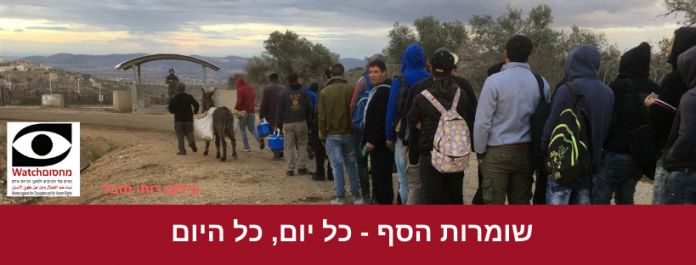By Camilla Ballerini
The Israeli movement “Machsom Watch” was born in 2001 from the willpower of 3 women who dedicated themselves to gathering Israeli women from all social classes, to give a voice to those who live in the Palestinian territories occupied by Israeli settlers. The group grew larger and now counts tens of members.
Their purpose is to inform the Israeli population who oftentimes remain unaware of the events that take place in Palestine, a few kilometers from the main cities, also due to the lack of coverage of these events by the media.
2021 was marked by numerous testimonies of the group from the occupied territories. The organization also held online meetings, recorded and accessible on their website such as the one concerning the crisis in the Jordan valley and in the southern hills of Hebron or the meeting with the lawyer Sahar Francis general director of Addameer Prisoner Support and Human Rights Association.
In the same year, it also released its 2020 annual report narrating the effects of the pandemic on the occupied territories. During the pandemic, members supplied many distressed villages in the Jordan valley with food. They worked, with the help of other associations, also in defense of the shepherds, often annoyed by Israeli settlers.
In April 2022, the article “Women Cultivating Hope 2022” was published in the “Summaries” section. This piece collects interviews conducted by activists with Palestinian women: they tell the testimonies of Naama, who works in a nursery and talks about her experience as a citizen of the West Bank; that of Doha, a West Bank citizen who reports the difficulties of life under occupation and the hope of peace. In their hopes and dreams is recurrent the desire to move towards a different life where they will be able to work without pressure from the authorities.
An eventful month of Ramadan
In May 2022, Machsom Watch documented on its website in the “Checkpoint Reports” section the events related to the Ramadan period, which this year began on April 1st and ended on May 1st. There are many reports of civil rights violations in the section.
During the first Friday of Ramadan, at Checkpoint Qalandiya, strict controls and waste at the entrance despite the pleas of civilians, including the elderly and disabled people. At the same Checkpoint, on the following Friday, soldiers denied entry and harassed an inhabitant, a woman with walking difficulties who was in a wheelchair: this was because, according to the computer system, she was found to be a family member of a possible supporter of terrorism. The author of the report reiterates how these lists become a burden on the shoulders of people close to suspects. The woman, after getting up to remark her disappointment, was physically rejected and sat down. This is proof of how checkpoint controls are often strict and gendered.
During the 3rd Friday of Ramadan, there were many Muslim praticants at Checkpoint Qalandiya who were simply hoping to cross the checkpoint in order to attend the prayer. The author was unable to document the male section, but the female section was full of women and was slow. Many have lost consciousness in the heat among the crows, and have been rescued by the volunteers present.
On their website, in the “Pictures taken during our shifts” section, you can find photos taken by the association’s volunteers, who carry out a hard work of documenting the occupied territories to show their fellow Israelis the pain that is experienced daily and not far from them.
Cover image: Machsom Watch
























